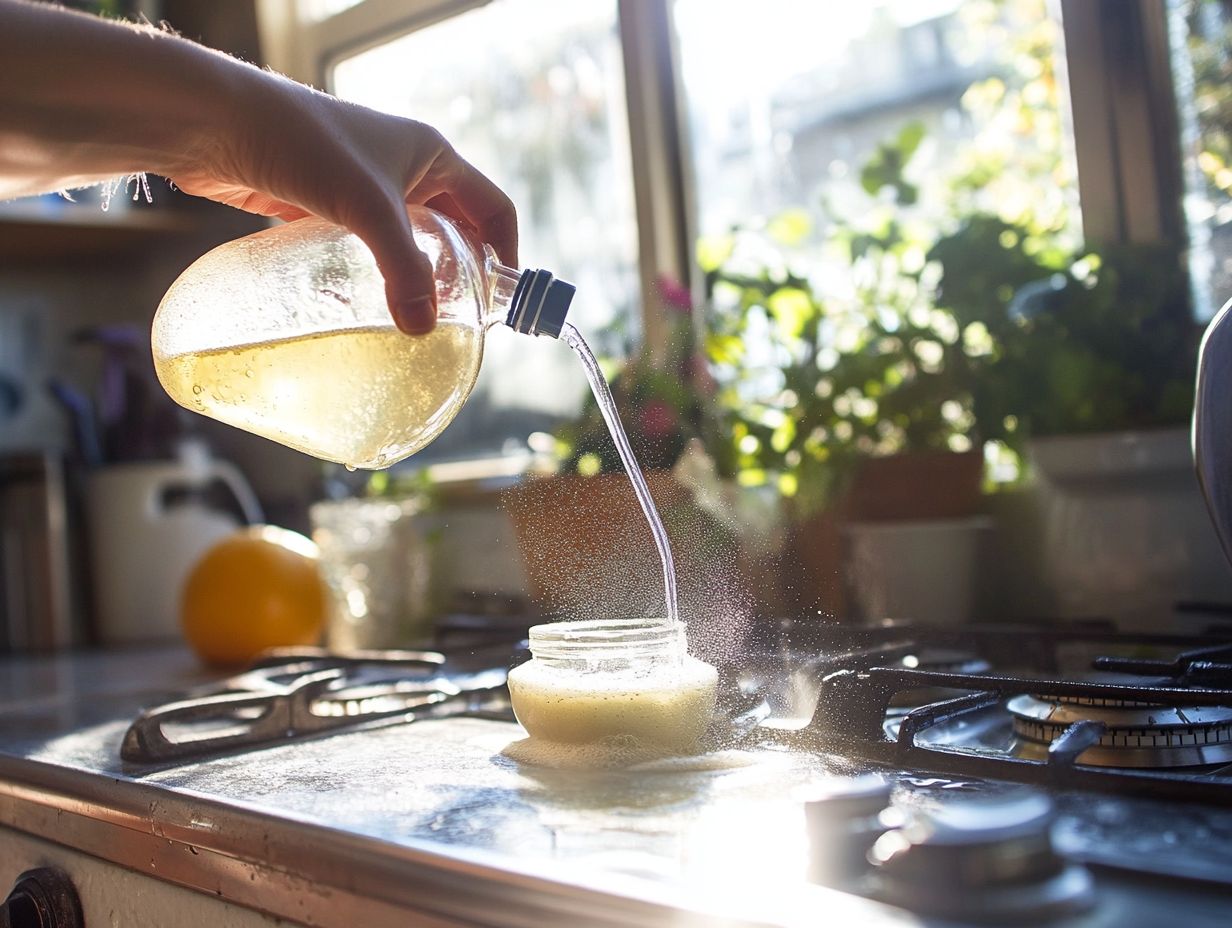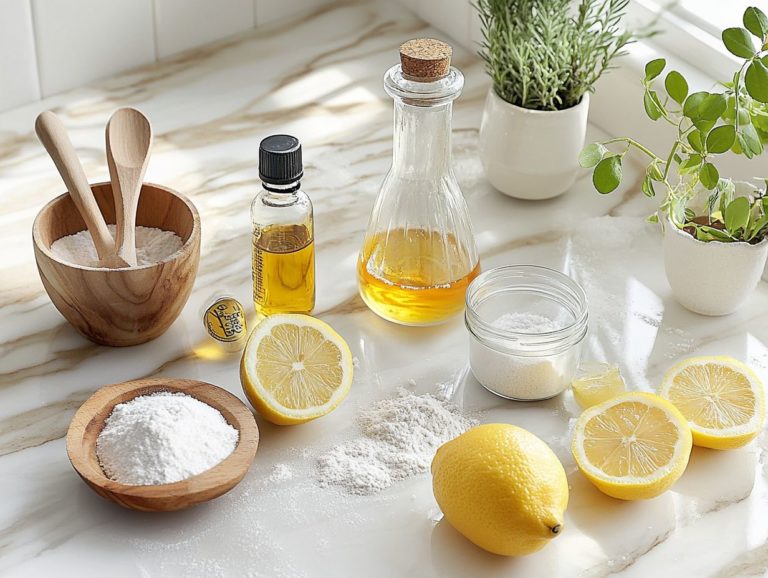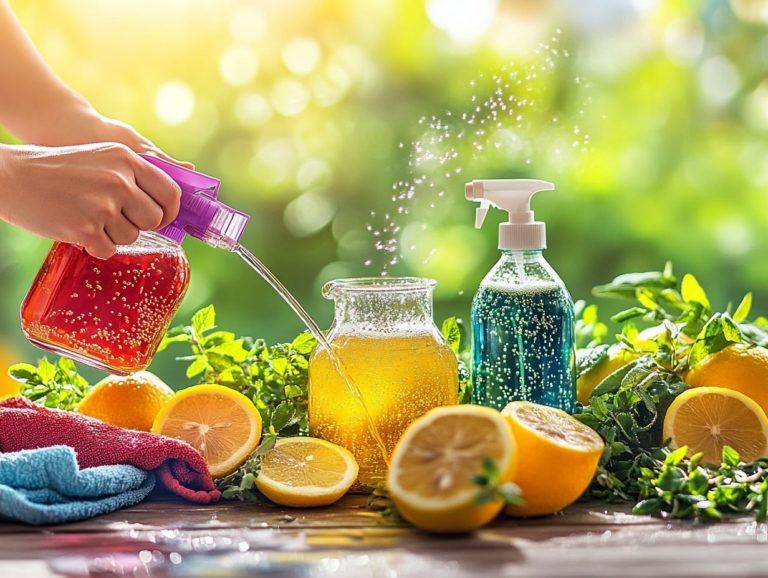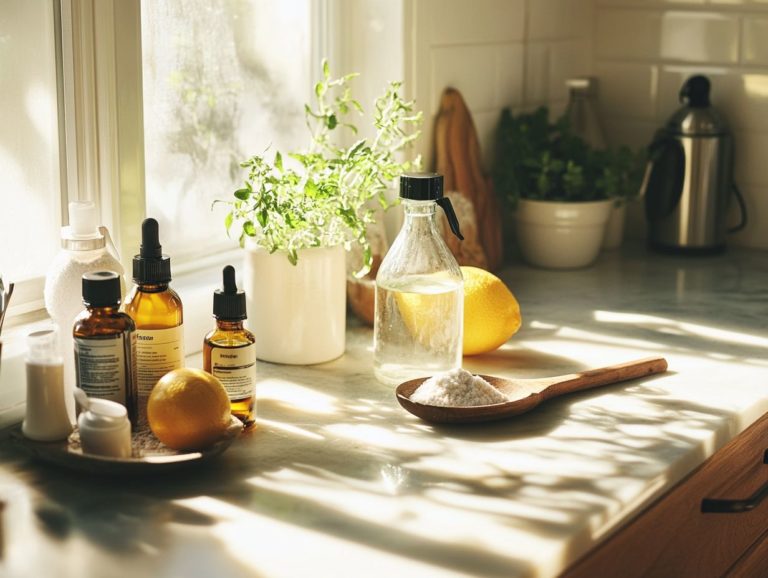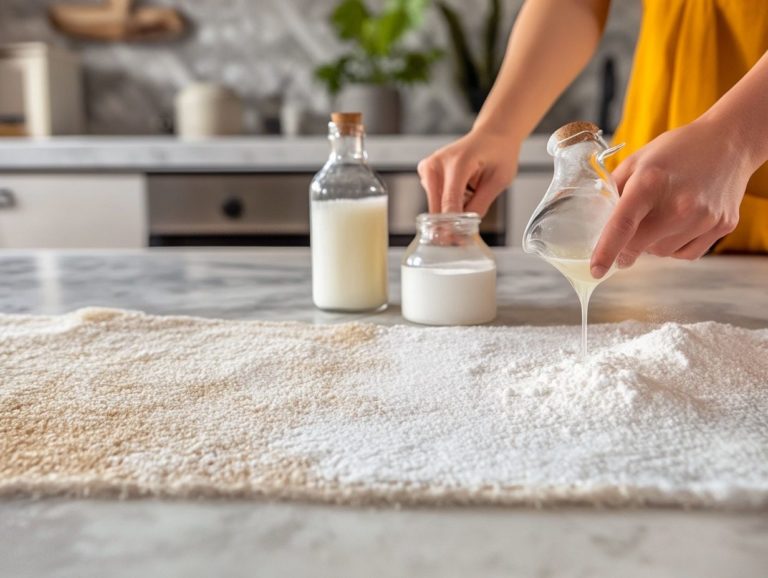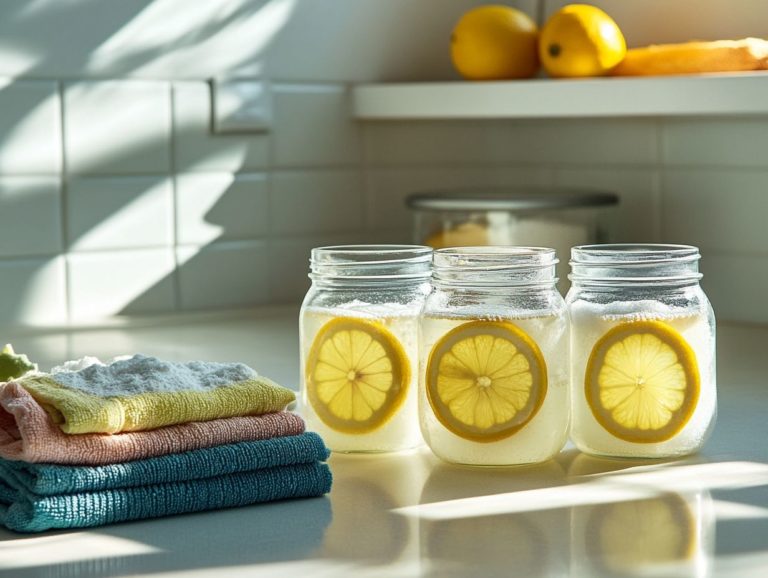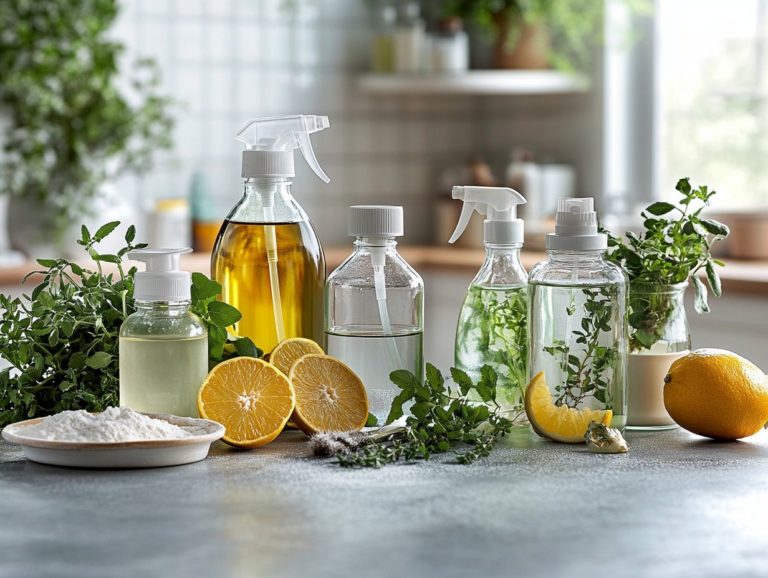Homemade Cleaner for Greasy Kitchen Appliances
Cleaning those greasy kitchen appliances may seem like an overwhelming chore, but it doesn t have to be a stressful experience, especially with easy-to-make natural handmade kitchen degreasers!
Crafting your own homemade cleaner tackles stubborn grime with ease while providing a safer, eco-friendly alternative to the harsh chemicals found in store-bought products. This article delves into the advantages of making your own cleaner, the potential downsides of commercial cleaning products, and the simple ingredients you ll need.
You ll find quick and easy steps to whip up your cleaner, explore alternative solutions, and discover essential safety precautions. Prepare yourself to elevate your kitchen cleaning routine to a whole new level!
Contents
- Key Takeaways:
- Why Use a Homemade Cleaner for Greasy Kitchen Appliances?
- What Ingredients are Needed for a Homemade Cleaner?
- How to Make a Homemade Cleaner for Greasy Kitchen Appliances?
- Are There Any Alternative Homemade Cleaners?
- How Often Should You Use a Homemade Cleaner on Your Kitchen Appliances?
- Are There Any Precautions to Take When Using a Homemade Cleaner?
- Frequently Asked Questions
- What ingredients can I use to make a homemade cleaner for greasy kitchen appliances?
- How do I make a homemade cleaner for greasy kitchen appliances using vinegar?
- Can I use baking soda as a homemade cleaner for greasy kitchen appliances?
- What is the best way to use lemon juice as a homemade cleaner for greasy kitchen appliances?
- Can I use dish soap as a homemade cleaner for greasy kitchen appliances?
- How often should I use a homemade cleaner for greasy kitchen appliances?
Key Takeaways:
Why Use a Homemade Cleaner for Greasy Kitchen Appliances?
Utilizing a homemade cleaner for greasy kitchen appliances is not just an efficient and safe alternative; it embodies a natural cleaning philosophy that enhances both your well-being and the environment.
By selecting a handcrafted kitchen degreaser, you can effectively eliminate the harmful chemicals often found in commercial cleaners, opting instead for powerful ingredients like white vinegar, baking soda, Castile soap, and essential oils.
This choice not only guarantees peace of mind regarding safety but also preserves the integrity of your kitchen surfaces, appliances, and countertops, all while avoiding respiratory discomfort or skin irritations. Plus, it helps to eliminate the buildup of grease and stains effectively.
What Are the Benefits of Using a Homemade Cleaner?
The benefits of using a homemade cleaner are abundant and significant, making it a top choice for maintaining a pristine kitchen environment. When you opt for homemade cleaners, you typically rely on natural ingredients like white vinegar, baking soda, Castile soap, and essential oils, which effectively eliminate grease and odors without the harmful side effects that often accompany commercial cleaning products.
This approach not only provides a cost-effective solution to your household cleaning needs but also allows you to customize your recipes. You can easily incorporate your favorite scents or adjust the strength based on your preferences. By choosing these natural alternatives, you significantly reduce your exposure to harmful chemicals that frequently seep into the environment.
Homemade cleaners are eco-friendly, contributing to less plastic waste through reusable containers, while their natural composition ensures safety for both you and the planet. They also provide an opportunity to incorporate safety tips and methods into your cleaning routine.
The effectiveness of these ingredients in tackling stubborn grease and stains has been validated through countless home tests, leading to a cleaner space while supporting a more sustainable lifestyle. Using these natural recipes ensures that your cleaning methods are aligned with environmental sustainability.
What Are the Risks of Using Store-bought Cleaners?
Using store-bought cleaners can expose you to significant risks, primarily due to the harmful chemicals they often contain. These substances can lead to respiratory discomfort and skin irritations, impacting not just you but your entire family. When you rely on commercial cleaners, you re essentially inviting a cocktail of questionable ingredients into your home, which can accumulate in the environment and degrade your indoor air quality.
These toxic compounds don t just disappear; they can leach into groundwater and wreak havoc on ecosystems, harming wildlife and disrupting essential natural processes. Over time, continued exposure to such chemicals may even pave the way for more serious health conditions, including asthma, allergies, and other chronic illnesses.
Moreover, many of these products come with vague labeling, leaving you in the dark about their full contents and potential risks. This lack of transparency raises serious long-term safety concerns and has sparked a growing awareness and demand for eco-friendly alternatives that prioritize both your health and environmental sustainability.
What Ingredients are Needed for a Homemade Cleaner?
Creating your own homemade cleaner is both simple and effective, utilizing ingredients that are likely already in your pantry. With just a few carefully chosen components, you can craft a potent cleaning solution that rivals store-bought options and is free from harmful chemicals.
Essential ingredients like white vinegar, baking soda, Castile soap, and lemon essential oil not only excel at cutting through grease but also infuse your space with delightful fragrances and natural antibacterial properties. This approach elevates your cleaning routine into an experience that is both refreshing and efficient, making it easier to tackle stubborn grime.
How to Make a Homemade Cleaner for Greasy Kitchen Appliances?
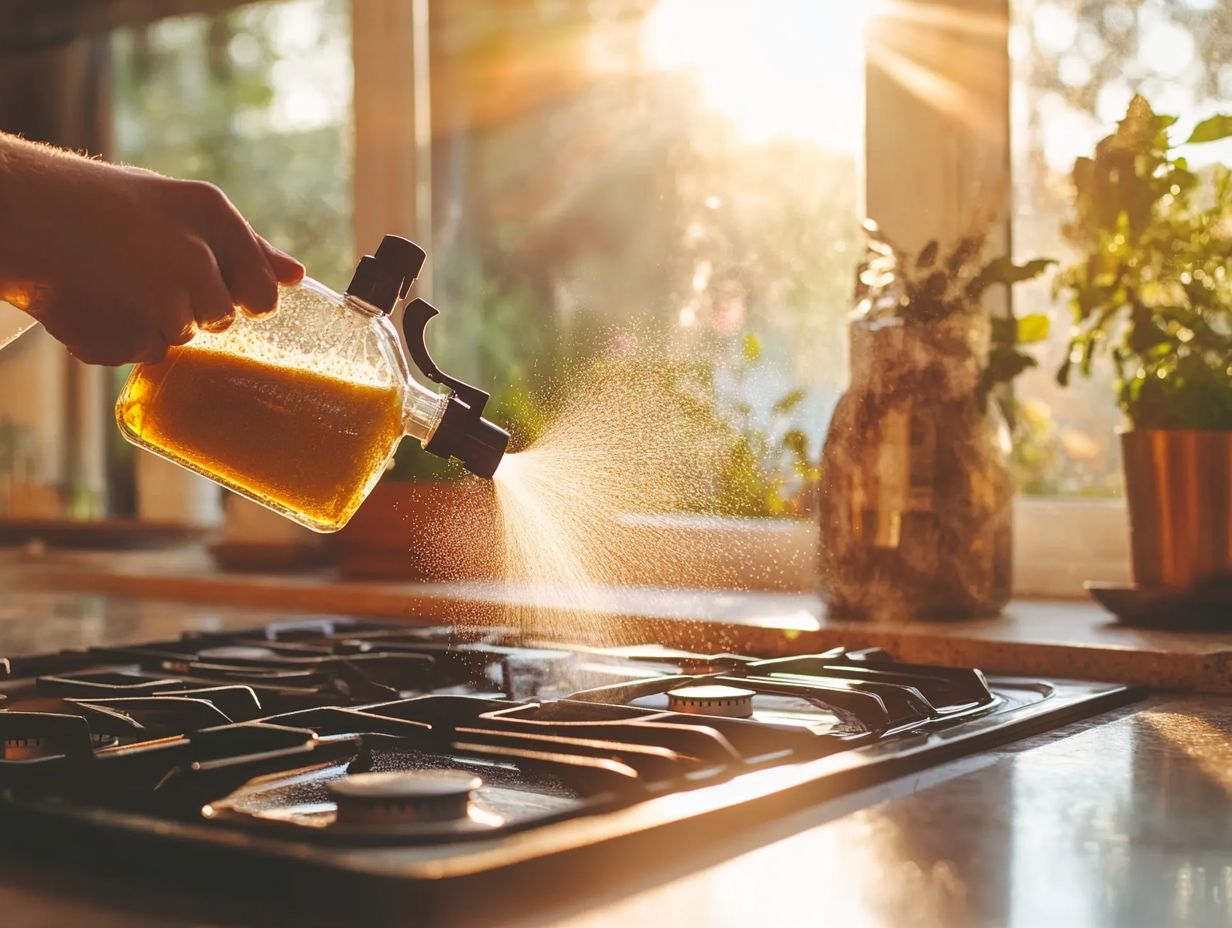
Crafting a homemade cleaner for those greasy kitchen appliances is not only simple but also a gratifying endeavor that gives you the power to tailor your cleaning solution to your unique preferences and requirements. From stovetops to countertops, a homemade cleaner can handle it all.
By playing around with a blend of natural ingredients such as white vinegar, baking soda, and essential oils, you can develop an effective and safe cleaning concoction that takes on stubborn grease while infusing your kitchen with delightful, fresh aromas. You can even include citrus essential oils for an extra fresh scent.
Step 1: Gather the Ingredients
To create your own homemade cleaner, the first step is to gather all the essential ingredients that will yield an effective and natural cleaning solution. You ll want to collect items such as white vinegar, baking soda, Castile soap, lemon essential oil, and a spray bottle for effortless application. Don t forget to have a sprayer for an even distribution of the cleaner.
White vinegar, for example, serves as a formidable antimicrobial agent, easily breaking down grime and disinfecting surfaces. Pair it with baking soda, which not only lifts dirt and stains but also neutralizes odors thanks to its mild alkalinity. Castile soap acts as a natural surfactant, enhancing your mixture’s ability to tackle grease and leave surfaces gleaming. These ingredients make a potent combination for an effective cleaning solution.
A few drops of lemon essential oil not only bring a refreshing scent but also amplify the cleaning power with its natural antibacterial properties. Using a spray bottle simplifies the application process, allowing you to reach every nook and cranny while maintaining control over the distribution of this eco-friendly solution. Ensure you mix the ingredients well in the sprayer to achieve the best results.
Step 2: Mix the Ingredients
Once you ve gathered all your ingredients, the next step is to blend them into a powerful cleaning solution. Combine equal parts of white vinegar and water. Then, add a few tablespoons of baking soda along with a few drops of essential oils for extra cleaning power and a delightful scent. You can also add a bit of Castile soap to enhance the solution’s ability to remove grease.
To ensure your safety while mixing these ingredients, it s essential to slowly add the baking soda into the vinegar and water mixture. This cautious approach will help manage any fizzing or bubbling that may occur. Use a large mixing bowl to contain any overflow and prevent spills. Consider using a wooden or plastic spoon to stir the mixture. Avoid metal utensils as they can react with vinegar.
Gently stir with a wooden or plastic spoon. Once everything is thoroughly combined, check the consistency. It should be slightly frothy, yet still liquid enough to pour easily. Proper mixing boosts the effectiveness of your cleaning solution. It ensures that all ingredients integrate seamlessly to fight dirt and grime.
Step 3: Apply the Cleaner
Once you’ve mixed your homemade cleaner, the final step is to apply it effectively to your kitchen appliances for optimal cleaning results. Grab a spray bottle and target those greasy areas, allowing the solution to sit for a few minutes before scrubbing with a cloth or sponge for the best outcome.
Before diving in, it’s wise to test the cleaner on a small, inconspicuous spot on the appliance to avoid potential damage. For stainless steel surfaces, use a microfiber cloth; it s your best ally in lifting grime without causing scratches. Don t forget to wear gloves while handling cleaning solutions to protect your skin from irritation. For stubborn areas, you might need to apply some elbow grease to ensure thorough cleaning.
For maximum efficacy, the cleaner performs best on surfaces that are at room temperature. Approach glass or ceramic surfaces gently to prevent streaking. Make sure to rinse any treated areas with warm water afterward to eliminate leftover residue.
Are There Any Alternative Homemade Cleaners?
Discover amazing alternatives to commercial cleaners that are just a few ingredients away! You have a wealth of alternative homemade cleaners at your fingertips, each tailored to meet your diverse cleaning needs in the kitchen. These alternatives are especially useful for cleaning appliances and countertops.
By leveraging natural ingredients, you can effortlessly combat grease and grime. Consider using apple cider vinegar and baking soda; both are superb substitutes for conventional cleaners. They deliver impressive degreasing capabilities, meaning they can break down tough grease easily, while keeping harmful chemicals at bay. Try creating your own cleaning wipes with these ingredients for an easy and effective cleaning solution!
What Are the Benefits of Using Vinegar as a Cleaner?
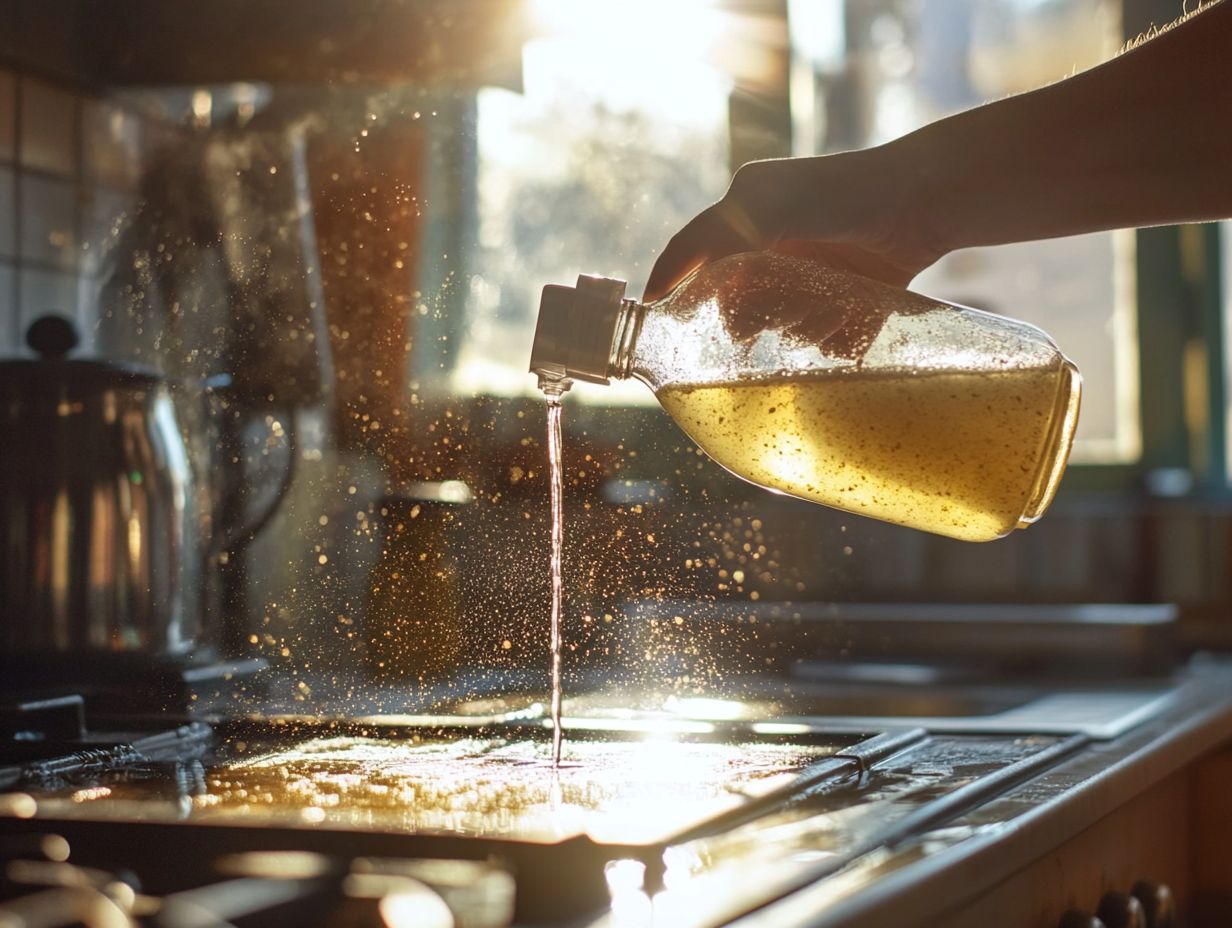
Using vinegar as a cleaner offers numerous benefits. It acts as a natural antibacterial agent and helps in removing stains and odors effectively. It s also an eco-friendly option that reduces reliance on commercial cleaning products.
Vinegar is remarkably versatile, serving as a potent deodorizer that neutralizes odors while functioning as a disinfectant to eliminate bacteria, stains, and grease from kitchen surfaces.
You ll appreciate its ability to cut through grease and grime, making it ideal for cleaning countertops, stovetops, and even appliances. Unlike harsh chemical cleaners, vinegar is non-toxic and eco-friendly, promoting a healthier living environment. You can even enhance its effectiveness by adding essential oils.
By opting for vinegar, you can be confident you re selecting a cleaning solution that won t introduce harmful substances into your home, especially in spaces where children or pets roam. This natural disinfectant not only cleans well but also leaves a fresh scent that enhances the ambiance of your living spaces. Enjoy peace of mind knowing you’ve chosen a safer alternative to commercial cleaning products.
Try these homemade solutions and transform your cleaning routine!
What Are the Benefits of Using Baking Soda as a Cleaner?
Baking soda, often combined with vinegar, is a staple in natural cleaning recipes.
Baking soda is an exceptionally effective ingredient that offers a multitude of benefits as a cleaner. Its rough texture helps remove tough stains, making it perfect for scrubbing away stubborn grease and stains. Its gentle, non-toxic nature ensures that you can use it safely on most surfaces in your kitchen, from countertops to appliances.
Baking soda is also a powerful deodorizer, effectively neutralizing those lingering odors that can be particularly unpleasant in confined spaces like refrigerators or garbage cans. You can even mix it with essential oils for a delightful scent!
When you combine it with common household items such as vinegar, Castile soap, or lemon juice, you’ll find its cleaning effectiveness significantly enhanced. This dynamic duo not only boosts cleaning power but also creates a delightful fizzing reaction that helps lift debris away from surfaces, making your cleaning process more efficient and enjoyable.
Incorporating baking soda into your cleaning routine can transform your home environment into a fresher and more inviting space. Its ability to eliminate odors and stains makes it an invaluable component in your cleaning arsenal.
How Often Should You Use a Homemade Cleaner on Your Kitchen Appliances?
Using a natural cleaner regularly can prevent buildup and ensure a more hygienic cooking environment.
How often you use a homemade cleaner on your kitchen appliances really hinges on how frequently you use them and the amount of grease that accumulates. For those daily cooking appliances, a quick spritz with your natural cleaner can work wonders. A more thorough cleaning can be scheduled weekly to ensure everything stays in top-notch condition.
Regular use of homemade cleaners can help maintain the efficiency of your appliances and prevent grease buildup. It’s essential to tailor your cleaning routine to each specific appliance and its usual usage.
For example, your stovetop or grill is likely to need more frequent care due to the inevitable grease splatters from cooking, so consider giving it a thorough clean after every few uses. On the other hand, appliances that see less action, like toasters or blenders, might only require a good wipe-down every couple of weeks. Keeping a spray bottle of your homemade cleaner handy can make this task easier.
Spending time cleaning boosts performance and helps prevent breakdowns. Plus, it creates a more hygienic cooking environment, ensuring that food safety remains a top priority in your kitchen.
Are There Any Precautions to Take When Using a Homemade Cleaner?
When using homemade cleaners, follow these tips for safety and effectiveness.
Homemade cleaners often offer a safer alternative to their commercial counterparts, but it’s crucial to take specific precautions to ensure safe usage and handling. Homemade cleaning products can still cause skin irritations or respiratory discomfort if not used properly.
Always conduct a small test on an inconspicuous area before applying your homemade cleaner to larger surfaces. This step is especially important when working with sensitive materials, as it helps you avoid any unexpected adverse reactions. This method can be particularly useful when dealing with natural cleaning mixtures or potent ingredients like ammonia or Castile soap.
What Surfaces Should You Avoid Using the Cleaner On?
Understanding the limitations of your homemade cleaner can prevent damage and maintain the integrity of your surfaces.
Certain surfaces may not be the best candidates for your homemade cleaner due to the risk of damage or discoloration. Knowing where to apply your solution with confidence is essential, especially when using potent ingredients like vinegar or citrus.
Avoid using acidic ingredients like vinegar on natural stone surfaces such as granite or marble, as they can etch the surface over time. Also, stay away from soap nuts or other unconventional ingredients unless you are sure they are safe for those surfaces.
When cleaning wooden surfaces, especially untreated ones or those with a wax finish, be cautious as water-based cleaners can lead to warping or swelling. Avoid using rough cleaning pads on delicate finishes, such as polished metals or high-gloss paint, as this can result in unsightly scratches. Understanding the material you are dealing with is key to maintaining your surfaces.
Always consider the specific characteristics of your surfaces. For instance, painted walls or furniture can lose their sheen when exposed to harsh chemicals. By understanding these compatibilities, you protect your surfaces and ensure that your cleaning efforts result in a fresh and spotless finish. Avoid using commercial cleaning products on these surfaces unless specified as safe.
What Precautions Should You Take When Handling the Cleaner?
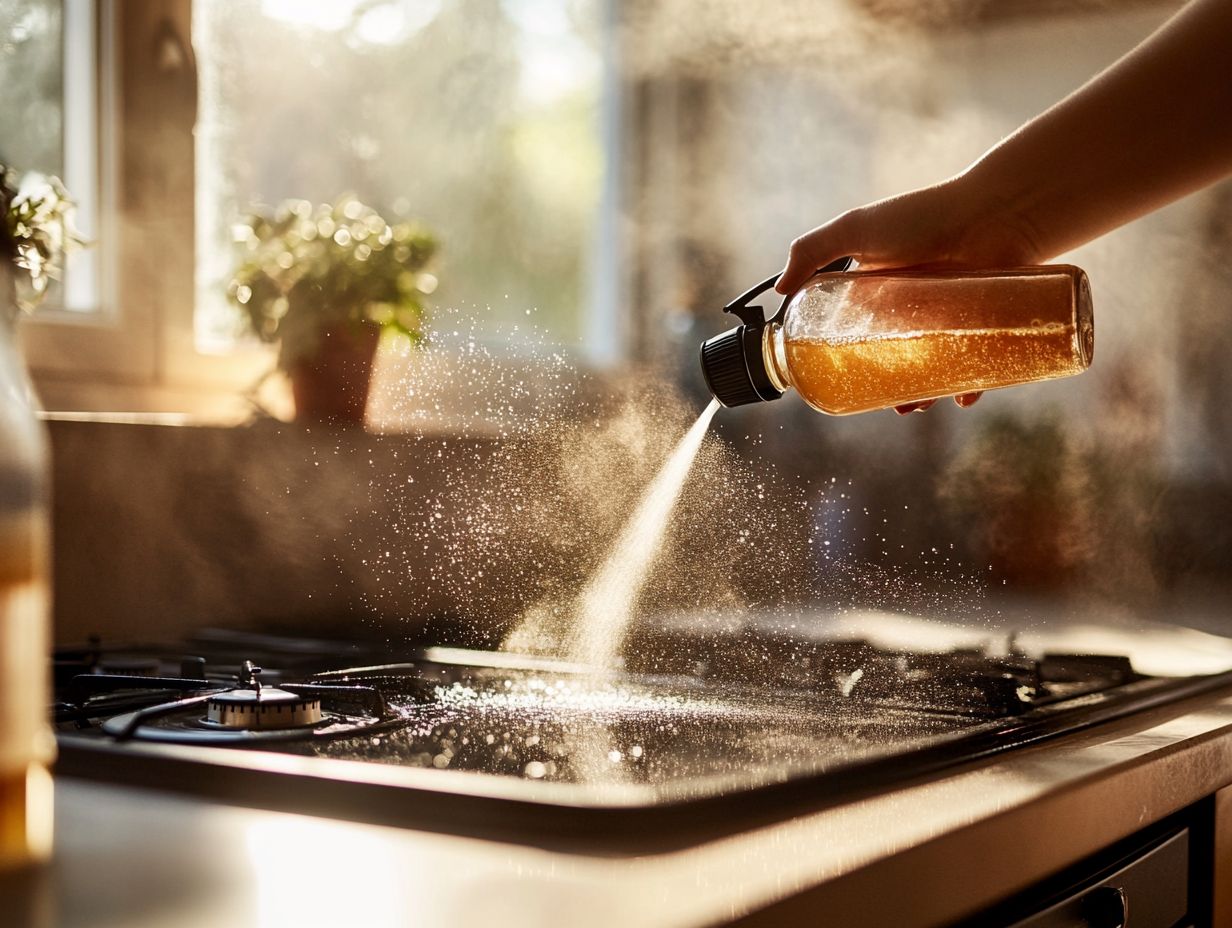
Handling homemade cleaners with care can ensure safe usage and prevent any mishaps.
When handling your homemade cleaner, follow these safety tips:
- Wear gloves to protect your skin, especially if it s sensitive.
- Ensure good ventilation to avoid respiratory discomfort.
- Be cautious of potential skin irritations when mixing ingredients.
- Wear eye protection like goggles during the mixing phase to shield your eyes from splashes.
- Carefully measure each ingredient and mix everything in a well-lit area to prevent accidents.
- Store your homemade cleaner in a clearly labeled container to avoid accidental misuse.
- Use a sprayer or wipes to apply the cleaner evenly.
If using this cleaner on surfaces that might contact food, make sure to rinse thoroughly afterward. Taking these precautions enhances your safety and promotes a more effective cleaning process.
Frequently Asked Questions
What ingredients can I use to make a homemade cleaner for greasy kitchen appliances?
Some common ingredients for homemade cleaners include vinegar, baking soda, lemon juice, dish soap, and essential oils.
How do I make a homemade cleaner for greasy kitchen appliances using vinegar?
Mix equal parts of white vinegar and water in a spray bottle. Spray onto the greasy surface and let it sit for a few minutes before wiping with a clean cloth. For added effectiveness, consider including essential oils.
Can I use baking soda as a homemade cleaner for greasy kitchen appliances?
Yes, baking soda is a great natural cleaner that effectively cuts through grease! Mix it with water to form a paste and apply it to the greasy surface. Let it sit for a few minutes before wiping off with a damp cloth. Adding some lemon essential oil can enhance its cleaning power.
Now that you know how to make your own cleaner, why not give it a try? Share your experiences or results with others and create a sense of community!
What is the best way to use lemon juice as a homemade cleaner for greasy kitchen appliances?
To clean greasy kitchen appliances, mix equal parts of lemon juice and water in a spray bottle. Spray the mixture onto the greasy surface and let it sit for a few minutes.
Then, wipe the surface with a clean cloth. Lemon juice helps break down grease due to its natural acidity. For a pleasant scent, you can add a few drops of essential oils!
Can I use dish soap as a homemade cleaner for greasy kitchen appliances?
Yes! Dish soap is a fantastic option for cutting through grease! Simply mix a few drops of dish soap with warm water.
Use a sponge or cloth to clean the greasy surface. If you’re looking for a more natural approach, consider using Castile soap, which is a plant-based soap known for its gentle cleaning properties.
How often should I use a homemade cleaner for greasy kitchen appliances?
It’s best to clean greasy kitchen appliances at least once a week to prevent buildup and maintain a sparkling kitchen. If you cook frequently, make sure to clean them more often.
Using homemade cleaners regularly helps keep your kitchen clean and inviting!

